Bolton is in the midst of a £1bn bid to revive the town and surrounding borough with multiple new building and regeneration projects. In the process, it is tackling issues common to many other UK towns and cities that are struggling to thrive
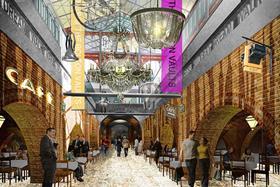
Introduction
Bolton is in the midst of a large-scale regeneration programme. Its transformation into a more alluring retail and leisure destination is well underway, along with large investments in its transport and commercial infrastructure. Putting its university into the heart of the town is a key feature of Bolton’s revival plans.
The organisations behind the Bolton scheme have much to do to get the plan right, and the challenges and dilemmas they face are ones that other towns and cities across the UK are wrestling with.
Our panel met to discuss:
- the challenges of who to attract to the town and how;
- getting the balance between academic, office, commercial, retail and leisure developments right;
- how to attract more inward investment and where from; and
- the role the university can play in helping to regenerate the town centre.
OUR PANEL OF EXPERTS
Tim Vaughan, chief executive, Moorgarth Group
Keith Davies, director of development and regeneration, Bolton Council
Councillor Ebrahim Adia, executive cabinet member, regeneration and resources, Bolton Council
Professor George Holmes, vice chancellor, University of Bolton and chair of Bolton’s economic partnership
John Coyne, chief executive, BCSC
Paul Wright, property director northern portfolio, NewRiver Retail
Simon Russian, head of development Bracknell, Legal & General Property
Alison Gordon, director of project development, New Economy Manchester
Andy Dines, associate director, Atkins
Felicity Lindsay, director, Wragge Lawrence Graham & Co
George Griffith, associate director, CBRE
Duncan Sutherland, chairman and regeneration director, Sigma in Partnership and Sigma Capital
Dan Parr, director, CACI
Liz Hamson, editor, Property Week (chair)
Liz Hamson: Keith, take us through the plan and the progress made to date.
Keith Davies: Back in 2006, our target was a £1bn project and development pipeline.We wanted to make sure we consolidated the existing retail outlets while also making the town centre a compelling leisure and cultural destination. We also recognised the potential the university had in terms of the transformation of the town centre, with up to 20,000 students coming to the university and coming to the town centre as well.
We are making progress. Many retailers are reporting sales and footfall growth, bucking the national trend in a lot of cases. The biggest challenge for us now is getting the message out. The perception in some quarters is that town centres like Bolton don’t have a future. Locally we also face challenges because people don’t necessarily see the positive change that is happening around them.
LH: Dan, you are very hot on the consumer and the data around that. What is it telling you?
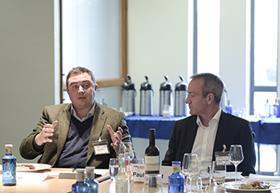
Dan Parr: When we think about how the consumer shops and interacts with a place, Bolton faces the challenge of being in the shadow of Manchester city centre, and there are some transport constraints as well because the catchment is constrained a bit by the motorway.
But when it comes to what you need to do for the consumer, all of the regeneration plans are gradually ticking boxes, whether the consumer realises it or not. What consumers want is for you to make it easy for them. Make the connectivity easy, make the range of reasons why they want to visit the town easy, make it easy to live here and make it easy to walk around.
I haven’t been to Bolton for a couple of years and I appreciate that we are in change mode but what struck me walking around is that there is a lack of signage from an outsider’s perspective. That’s one of Bolton’s challenges: signposting what’s going on and how you get around.
LH: George, you’ve seen things change quite a lot over the last nine years. What are your thoughts on the progress so far?
George Griffith: The progress is impressive but because it’s a work in progress, for example with the transport interchange, it’s difficult to sell to people. Having the imagery for the average visitor would be nice to show what it’s going to be like.
LH: It creates a buzz doesn’t it? People will say to themselves: ‘I might come back here when it’s finished to have a look.’
Paul Wright: It’s important for young people, too. They will see it and think: ‘It’s fantastic, I’m going to stay here and get a job.’
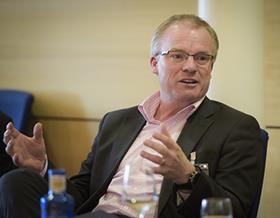
Tim Vaughan: You also need to think about attracting the people who already live in Bolton and winning them back from developments like the Trafford Centre. We need to ensure that we have the national retailers but that we also have that eclectic mix of independent and local guys. That’s how we can differentiate ourselves from other town centres. The art element is also important in making it personal to the local community.
LH: It’s important that you have that local stamp and turn locals into brand ambassadors, isn’t it?
TV: Our research shows that, demographically, they are a very loyal population, but they have started to go elsewhere. We genuinely think we will be able to get them back in, but you’ve got to have the attractions to do that.
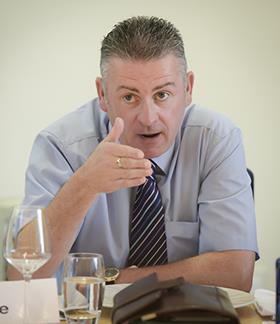
John Coyne: The important thing is to differentiate Bolton, not to try and remodel along the lines of the Trafford Centre but actually to be special to the people of Bolton and the surrounding communities.
Town centres like Bolton are in my view absolutely here to stay. In fact, they have a very bright future, but what towns everywhere have to understand is that it’s not a competition. It’s all about differentiating your destination.
KD: Maximising the character of the town centre is important. People young and old want to gather so you need to provide the facilities around that and invest in events like the food and drink festival to get people used to coming here. One of the other things we’ve tackled is the issue of parking. We addressed it by investing in free parking every weekend.
LH: What impact has that had?
KD: It’s had a phenomenal effect. Volume is up by 90% in terms of the multi-storey car parks and as well as people using it when it’s free, they are coming into town when they have to pay for it as well.

Duncan Sutherland: My problem looking in from the outside is knowing what the reason is to come here. What is Bolton trying to set out to do? What is it about? In 20 years’ time, what does Bolton see itself as? How does it see itself in relation to Greater Manchester?
How does it see itself in relation to the rest of UK? Because the real competition is with other towns and cities in the UK and further afield. If you want to get foreign investment into Bolton it’s not going to come unless you have that wider view. What you’ve got at the moment is a lot of good ideas and individual development sites without any connection.
You have the university, which is a fantastic asset, but how does it connect to the rest of the region? How do all the disparate elements join together?
LH: What do you suggest?
DS: Step back and say: what is it we’re actually doing here? What do we want the town centre as a whole to be in the next 20 years?
Look at Lille in northern France. When I first went in the 70s, the town centre was devastated: all the traditional industries had gone and there was nothing there, no community. The mayor started to develop the centre of Lille as a key business district and now it’s the third biggest business centre in France.
He had this vision of what Lille was going to be like, as well as the satellite towns around it and the connectivity between them. They have all benefited.
I think there has to be a process like this that says ‘this is what you are going to do’ and by doing that you start to bring both public and private investment in. But I don’t think that’s going to happen if you just look at things as individual developments.
KD: We deliberately didn’t look at Bolton in isolation. When we looked at all the town centres in greater Manchester to get a sense of where they fitted in the jigsaw, and what they offered, the university emerged out of that as our USP.
LH: Do you not think the plans for the university will be the catalyst?

Professor George Holmes: In 20 years’ time I see Bolton being a university and innovation town. On the university site at the moment there are 25,000 full-time learners coming in and out every single day. We are moving them into the city centre now.
My question when I came here ten years ago was: do we stay in the city centre or do we move out? That was a really serious internal strategic question and I went land shopping around the area for places to put a £250m campus.
The problem with that was that we would create another Lancaster, which is wonderful but is a self-contained, traditional campus university. We decided to stay where we were because it creates the university with a destination.
Universities are not only engines of economic growth in their own right; they also provide a lot of students who stay here after their studies finish. You will not see a separation between town and gown here. Over time, we will see the creation of a single town centre campus.

GG: Our experience is that having more students in the city centre creates an environment that is much more attractive, not just to students but also the young professionals who will want to come and live and work in Bolton. It creates an entirely different economy and atmosphere by having that number of students.
The drive to decrease the number of roads and increase the pedestrianisation is also good because, increasingly, students will find it very difficult to come to university with cars, so you have 4,000-5,000 people living in Bolton who you hope don’t have cars.
That type of environment is quite different to purely retail where you’re talking about the requirement for free car parking and having to attract people by car.
I think that having more students in town will make it a more personable city that people want to come to work and live in. You don’t want there to be barriers for them going between town and the university campus. You want them walking between the day campus and the night-time campus of the city centre.
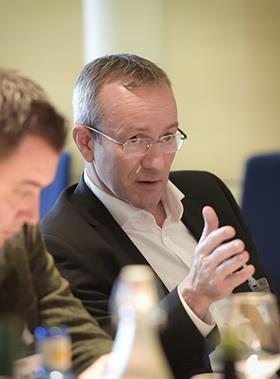
PW: There is, however, a big distinction to be made between pedestrianisation and pedestrian priority. I’ve seen so many cases nationally where pedestrianisation has just killed the place. We talk about the evening economy being so important, and with pedestrianisation, when the shops close come four-thirty in the afternoon, it’s dead.
That doesn’t help with the leisure agenda because you’re having to park and walk only to find that the restaurant you wanted to go to is dead and so you stop spending any time there. Preston was a good example where they opted for more shared environment rather than full pedestrianisation and that has worked quite well. I think pedestrian priority is the key thing.
LH: Where do students go in the evening? Do they go out in Bolton or do they go out to Manchester?
GH: At the minute, some do go out in Bolton but most get on the train and head Manchester way.
LH: That’s a challenge, isn’t it?
GH: It is. We currently also have the problem that we have two residential sites and they are split because, of course, we are the merger of two institutions going back. The Chadwick site is very much isolated from the town. I want to relocate them into a single place to add to the critical mass. Otherwise at weekends everyone clears off back home and that kills the buzz.
PW: What gives you your USP as a university?
GH: In this area, the health industry is strong. If you were to take a walk around you would see dental laboratories. There’s one of the largest concentrations of UK laboratories and small businesses of between five and 20 staff here in Bolton. There are dozens of them.
These firms have invested in us. They have paid for equipment because they realise that most of their staff are in their late fifties and are retiring. We now have two absolutely state-of-the-art dental laboratories here in the new building. That is a good illustration of the sort of nesting that’s going on here. We’re bringing in a racing team on campus, RLR racing, to help the students in advanced performance engineering. Likewise, the university’s special effects degree course is unique in the country and students often go on to work within film, TV and theatre.
LH: What about retail? Where are the students shopping?
GH: They’re shopping in Bolton.
TV: It’s important to remember that this isn’t a small place. This is a big town; it’s not just the students. You’ve got a quarter of a million people and some of them were not coming into the town centre. You’ve got to focus on your indigenous population as well and get them interested in coming back and shopping in the town.
GG: I think the students have a key role in persuading people to want to come back to Bolton. We should look at student accommodation as part of a wide spectrum of different types of accommodation for young people.
When you get 2,000 or 3,000 beds, that will create its own economy. It will be attractive in its own right for young people, and that will be the sort of thing that will start to attract young people to want to stay in Bolton rather than move out to Manchester.
KD: We also need to remember that of the 20,000 students that come here every day during term time, most of them are locals. Most have one, two or three individuals nearby, family mostly, which means locally we’ve got 80,000 people that we directly connect with every day that are more or less indigenous to this town. One third of the entire population is connected to this educational establishment zone every day. If the student goes home and tells the three people they are connected with that good things are happening here, it’s massively powerful marketing.
LH: Do you think Bolton can be part of the northern powerhouse?

Ebrahim Adia: We absolutely are. Bolton should be selling itself as a lower-cost destination for businesses that can’t afford to be in Manchester or Salford, and I think we’ve got something that’s quite distinctive. In terms of the bottom line, we have a package here that works.
LH: Simon, what are your perceptions of Bolton as an investor developer? You haven’t got any assets here at the moment.
Simon Russian: From a retail leisure point of view, we don’t have any money invested here. What we look for is that point of difference: what is Bolton’s USP? Investors have the choice about where they put their money, so what’s different about Bolton? How joined up is it? What else is going on in the town? How active is the public sector in promoting the town centre? As an investor, you want to have a good feeling about how your money’s going to grow. It does need that brand thing: why a consumer will want to go to Bolton as opposed to going to Wigan or Bury.
LH: What about Bracknell? What lessons can be learned from that?

SR: I think the lesson was: how do you come up with something that’s new and innovative? If you are selling to a co-investor or a major occupier, why do they want to come to that town? You have to work really hard creating a brand which not only the consumer can latch onto, but which also sells it as a place where there’s a lot of money going into the infrastructure, education and public realm to make it all fit together. It’s a really hard sell, and you’ve got to have a completely joined-up, long-term view.
EA: Political culture also matters. What you have in Bolton is a great political consensus across party lines. Developers and investors can take some comfort when making investment decisions that we will find a way through any challenges and difficulties. We are among the best in terms of what we do, and that should reassure investors that they are working with a high-performing council.
LH: What else can be done to attract more investment?
Duncan Sutherland: I was director of development for Coventry and we had similar issues to Bolton. The city centre was quiet and retail was declining. We came up with 20 reasons companies choose for relocating to a town and top of the list was the state of the city centre. They want to know it is somewhere they can live and enjoy the culture and the shopping. Second was education, third was housing choice. If you get those three right then there’s no reason you can’t succeed.
Felicity Lindsay: I’m interested to know how Bolton plans to position itself in the future.
KD: A big part of it is about investing in the social aspects of the town centre. By investing in that social capital, by putting events and festivals on, you create a place of fun and make it a place where people feel safe and where they want to go shopping or to visit a museum or gallery.
LH: Paul, you don’t have any assets in this neck of the woods. Why is that?
PW: It’s not that we would not invest in Bolton; it’s more a question of picking the right assets. It’s interesting that there is a lot more going on in Bolton now, and I really applaud the joined-up thinking going on here.
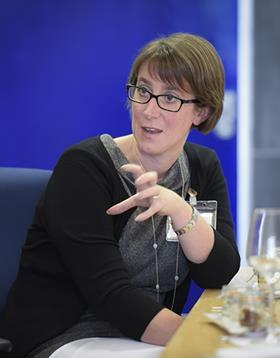
LH: Tim, tell us more about some of the challenges that you have faced.
TV: A big challenge for us was the legacy of the Market Hall scheme. It was a huge symbol and the town was very proud of it. In 2007, the previous developer stripped out the old market and underestimated the impact that would have on the town. There are still local people around who won’t go back to Bolton town centre because of the redevelopment. You have to address those local people and get an eclectic mix of retailers back in.
Market Place shopping centre was really struggling when we bought it; 60% of it was occupied with short leases. We’ve made considerable progress; we’ve doubled the size of Next and brought in New Look, but you can’t be solely fashion-focused. We’ve got the restaurants and bars going into the vaults and around the periphery. We’re going to extend that café culture down the side of the Market Hall and, of course, we’ve got the cinema as well.
Getting the defectors back in remains the challenge. It’s a combination of things, really, to create somewhere that’s vibrant, entertaining and fun to visit. I want it to be a cool place that the youngsters would be proud to spend time in and then they will bring their parents too.
LH: So are you going to be a 24/7 town?
TV: I think nine in the morning until midnight is realistic. We hope to reintroduce some of the more artisan elements of the old market that may have been lost to win back some of the people that used to visit. That might be the local guy selling skateboards and T-shirts or an Apple reseller. It’s those slightly specialist shops that are more destinational. Mixing the retail and leisure offer should allow us to successfully extend the hours of trading.
LH: Is there a cultural hook to some of this? You have some very nice buildings. Is there anything you can do to make more of the art and culture on offer?
TV: There is quite a musical culture here; there is a Bolton scene and that brings the young people in. We are going to be doing some street art by local artists and there are going to be scenes on display of Bolton as it used to be.
This is where Samuel Crompton came from, the inventor of the Spinning Jenny, and the Bolton Museum has warehouses full of fascinating historical elements of the town that we are subtly trying to introduce as points of interest.
LH: Could more be done to create more of a mixed-use environment?
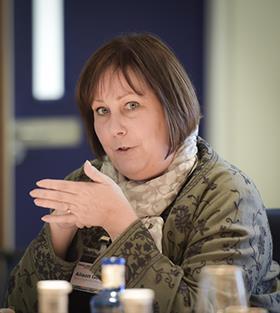
Alison Gordon: We know enough about our town centres and about Bolton town centre to get it right, and one of the big pieces for me is really attractive residential to create that critical mass that will entice people to come here. We know demand in the Greater Manchester conurbations is growing and we will be desperately short of residential in the next 10-15 years. We can make the most of that.
I think that one of the key drivers has to be increased residential. You’ve got to create a critical mass of people. The work that George is doing in terms of trying to bring in a student residential campus is hugely important.
LH: Is there enough scope to do that?
KD: Absolutely. We are already starting to look at areas we can re-designate as residential to bring more residential right into the centre. We will be challenged around space for residential and our first port of call will be doing it in the centre rather than out in the green belt.
TV: We’ve also got to create more offices. That underpins the daytime trade while residential underpins the night-time trade.
Andy Dines: Is there any scope to get more residential around the interchange? Because obviously there’s connectivity into Manchester there to help create options for commuters.
KD: Yes, there is. There are two areas when I was talking about re-designating from mixed use to residential. One is Church Wharf, which is right alongside the Market Place, the other is what we describe as Merchant’s Quarter, which was going to be offices and mixed use but which is in the right location for a big mixed residential scheme close to the interchange.
LH: Wrapping up then, where do you all think the town centre will be in 10 years’ time and what needs to be done to realise that vision?
KD: In 10 years’ time, our vision is as I articulated. This is going to be a different town centre to what it was 20 years ago: restructured with a different dynamic in terms of office occupation, students focused on the town centre and a really strong retail, leisure and cultural mix.
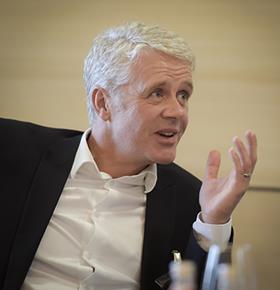
GG:
For me, what will make Bolton a successful, liveable city will be the success of the university, much more than people necessarily think, which will be key in attracting people into Bolton. I think that will be a critical success factor.
TV: The important thing is to answer the question: what is Bolton? Businesses focused in the town centre will really help to regenerate it, and the university is massively important too.
FL: For me, it will be about articulating the vision, knowing what you’re aiming for and getting out there and doing it now. Don’t wait.
DS: In 11 years’ time, HS2 trains will be coming into Piccadilly with the chance that compatible trains will be coming through Bolton on their way to Glasgow. If that’s the case, is it worth asking how long it takes to get from Bolton to Birmingham or London? Do you start positioning yourself in that mode? I think most other cities are.
AG: One area we have not touched on is the importance of culture and the asset that Bolton has in the Octagon. The number of acts that have come through it is remarkable. The other thing we did not talk about is the huge opportunity to further develop Bolton’s east-west links to Greater Manchester.
PW: It’s quite simple really. The more you focus on the town centre, the more investment will come in and the better it will be. You will stop people going to the Trafford Centre more of the time.
AD: I also wonder if there’s a story to be told around leisure and sports with Rivington and the West Pennines on the doorstep. It’s a fantastic location for that kind of leisure and sports.
I’m a father of a 17-year-old who is looking at Bolton as a potential university. When I go back, I will tell him that there is momentum here. I think it will be a great place for him to be a student with great opportunities.
A redeveloped Bolton takes its place in the northern powerhouse
One of the cradles of the first industrial era, Bolton has been busy reinventing itself as a key component of the emerging northern powerhouse.
Bolton’s ambitious £1bn scheme, first put in place in 2006, is already reshaping the town centre and neighbouring university campus with £227m of investment in new retail outlets, a revived marketplace, new leisure, educational and cultural facilities and a new transport interchange.
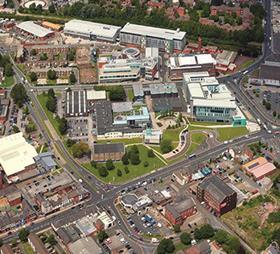
The programme is well-advanced on multiple projects including: a £90m Innovation Zone Knowledge Campus housing Bolton College, Bolton Sixth Form College and the University of Bolton; the £31m Bolton One Health Leisure and Research Centre; and the £4.5m redevelopment of the iconic Bolton Market. There’s also a new nine-screen cinema and restaurant space as part of the £20m refurbishment of Market Place Shopping Centre.
When completed, Bolton’s new £48m Transport Interchange will offer integrated transport links connecting the area to Manchester in 20 minutes, Manchester International Airport in 40 minutes, and London in two and a half hours.
Significant investment in the £394m visitor economy, including an annual events programme with a strong town-centre focus, helped the number of visitors to rise to 6.4m in 2013.
As well as attracting local shoppers and visitors from further afield, the architects of Bolton’s grand revival plan to attract new businesses and inward investment with more industrial and housing stock, as well as business grants and incentives, economic development and innovation zones and competitive business rates.
Other significant projects include the £202m investment in Logistics North close to the motorways and the £265m Rivington Chase development, a mixed-use scheme including up to 1,700 new homes, employment areas, local shops and facilities and major areas of public open space.
The town is investing heavily in state-of-the-art university and college facilities, including further expansion of the Innovation Zone Knowledge Campus and Science, Technology, Engineering and Mathematics centre (STEM); University Technical College; Newport Street Gateway Improvement Scheme and office development; and a new £40m academic village.
ABOUT THIS FORUM…
This event was chaired by Property Week’s editor Liz Hamson and took place on 15 October 2015 at Bolton University.
If you are interested in hosting or participating in future events, please contact Niki Kyriacou, Events & Client Solutions Sales Director, Property Week.
Tel: +44 (0)20 8253 8692
Email: niki.kyriacou@propertyweek.com


























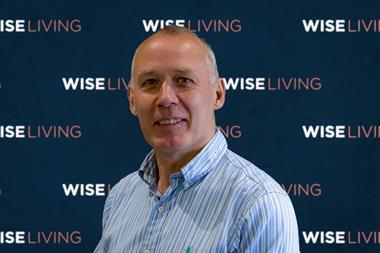
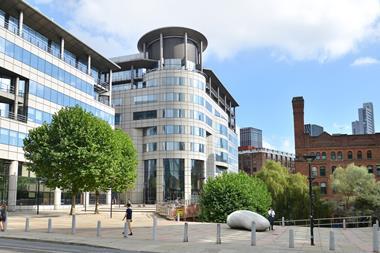
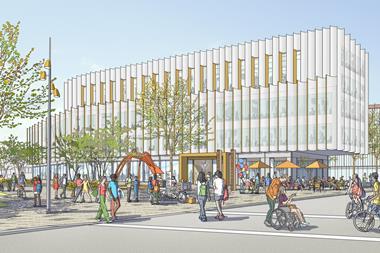
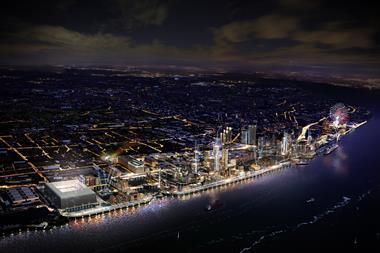
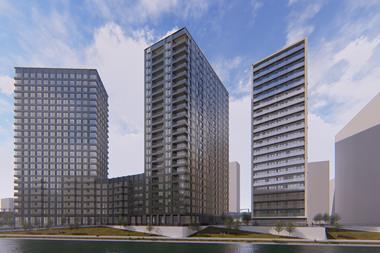
No comments yet